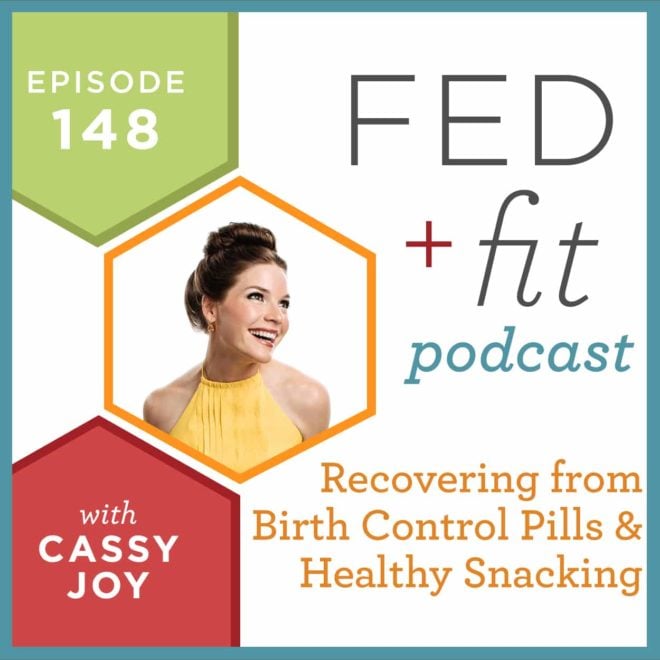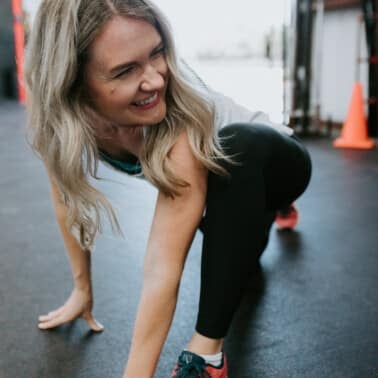On today’s episode, I’m chatting with reverse interviewer Natalie about Recovering from Birth Control Pills and Healthy Snacking!
We’re back with our 148th episode of the Fed+Fit Podcast! Remember to check back every Monday for a new episode and be sure to subscribe on iTunes!
Find us HERE on iTunes and be sure to “subscribe.”
[powerpress]
Episode 148 Sponsors
- ButcherBox – for $15 off + free bacon (!!) with your order
- Wine Fellas – use the code “fedandfit” for $10-off your first wine club shipment!
Episode 148 Transcription
Today’s show is brought to you by my friends at Wine Fellas! Wine Fellas is your wine club for small allocation, hard to find, natural wines from around the world. They specialize in organic and biodynamic wines that are made using traditional wine making methods, but with minimal interventions. They’re free of added sugar and chemical additives. They’re low in sulfites. They’re bottling the wine world describes as “natural wines.” These are wines as they were meant to be enjoyed, with nothing standing between you and pure, expressive fruit.
What I love most about Wine Fellas, aside from the fact that they only source the best, natural wines in the world, but they also go the extra mile by giving you a fact sheet on each bottle that contains authentic alcohol content, residual sugars, sulfur dioxide in parts per million, pH, and acidity. Learn more about Wine Fellas by visiting them at www. WineFellas.com. Be sure to use the code Fed and Fit for $10 off your first wine club shipment.
Cassy Joy: Welcome back to another episode of the Fed and Fit podcast. My name is Cassy Joy Garcia. I am your host for this 30-minute mindset, food, fitness, all those good things show. And today I am joined by a Fed and Fit listener. Her name is Natalie. And if you’re unfamiliar with reverse interviews, it’s where I have a fabulous reader or listener writes in with a really great question, and I invite them to come on the show to ask this question on a recording. And we get our conversation recorded.
So today I’m joined by Natalie. She is just recently relocated to the Pacific Northwest, up near Seattle from the East Coast. I’m so excited to chat with you today, Natalie! Welcome to the show!
Natalie: Thanks for having me. I’m excited.
Cassy Joy: Yeah, definitely! Well tell us a little bit more about yourself. And then feel free to pepper away with questions. {laughs}
Natalie: Sounds good. So like you said, we just moved here. It was a big change. And before we moved here, I basically got into the food and fitness sphere, whatever you want to call it, by working at a gym for a long time. That’s when I kind of learned about paleo, not caring about your actual numbers, and more about what your body can do. I found a bunch of food blogs, and yours was one of them, and I love it.
Cassy Joy: Yay!
Natalie: Yay! So my question is basically, because you talk about nourishing your body, listening to the cues that it gives you. And I am a person who; I feel like I’m constantly hungry. And a I have a couple of bites of food, and I’m full. {laughs} So literally when you talk about when you go out to eat, put away half your plate. I eat half of the half. And I feel like I’m done. So when I do go out to eat, if I go out with friends, it’s a little embarrassing so I’ll usually overeat.
Because you don’t want to; I don’t know. I just feel like I don’t want to leave a ton of food on my plate. And also it usually tastes better. And then at home, I know what I want to eat so I’ll just make much smaller portions. And at home, when I cook at home, I do cook paleo. But out of the house I don’t.
Cassy Joy: OK. Got it. I’m taking notes. I promise I’m not zoning out. {laughs}
Natalie: No, you’re good. But yeah. And then no matter how much I eat, I feel like maybe an hour, maybe two, I’m hungry again.
Cassy Joy: Ok.
Natalie: So I’m trying to figure out; should I be training my body to eat a bigger; like three meals a day. Or should I keep kind of what I call grazing. And I’m sure other people call it that, too. Where I just eat a bunch of small portions all day long.
Cassy Joy: That is a great question. This all comes down to; of course, I have a bias. Right? Towards this answer. And I’m definitely going to give you that. But I do want to say, before I get to my personal bias, and my professional bias, is that when it comes to nutritional “should’s”, right, there’s going to be a different right answer for everybody. There are some folks listening who may do better as grazers. And there are some folks listening who do better with full three big meals a day, no snacking in between. Right?
So it’s going to vary. But it sounds like you are a grazer looking for something else. Is that appropriate?
Natalie: I think; I just feel like I’m not getting enough nutrition per meal.
Cassy Joy: Yeah.
Natalie: I’ll graze. I feel like something is missing. It just doesn’t feel right.
Cassy Joy: That makes perfect sense.
Natalie: Because no matter if I eat a lot or a little, I’m still hungry an hour later.
Cassy Joy: Got it. Ok. That’s really fascinating. So it sounds like, metabolically. I’m going to pull back, let’s think 30,000-foot view, ok of what’s going on on a chemistry level of the body. To keep it super simple, we’re not going to get too far into the weeks. But in general, people are either fat adapted or sugar adapted. Are you familiar with these terms? I’m not trying to put you on the spot. I just want to make sure I’m not …
Natalie: No, yeah, I totally got it.
Cassy Joy: Ok good. I figured you were. So for listeners this is maybe the first time they’ve ever heard about fat adapted versus sugar adapted I’m going to briefly go into it. So somebody who is sugar adapted metabolically; again, 30,000-foot view. Their bodies, our bodies, are essentially depending on sugar for energy. And we need that little boost, that little bite, the snack, or something in order to feel like we have some energy to get through the mid-morning and the midafternoon.
And that’s why snacking tends to become something that’s very, very regularly scheduled. Right? It’s like, clockwork. One hour, two hours after a meal, we’re ready for another small bite. Whether we ate a huge meal or a small meal, we’re still in a sugar adapted metabolic state. Right? So we’re needing something else in order to give us a boost of energy.
Whereas fat adapted, which is the primary goal of a really; I would say the Fed and Fit Project, the goal is really to get you to be where you’re fat adapted. I hope you can’t hear Gus; he’s barking in the background. Real life here, on the Fed and Fit podcast. {laughs} There’s a good chance my mother-in-law walks in in a second, also and everyone is going to be all a tizzy. But the goal of the Fed and Fit Project is to get you to where you are truly fat adapted. Which in other words, you are metabolically nimble. So you’re able to go through spells of not having snacks.
So let’s say you have breakfast at 6 a.m., and lunch at noon. That’s a long period of time, right, to go without food. And your body, in that period of time, is fat adapted and can rely on fat stores for little burst of energy as it needs it. And then when mealtime comes around, it can also tap into using those sugars right away, as well.
So, I would say, it sounds like you’re kind of on the verge. {laughs} Can you also hear him knocking on the door? {laughs} To come in. Goodness gracious. It sounds like you’re on the verge. Teetering between sugar adaption and fat adaption. Does that kind of sound; does that resonate a little bit?
Natalie: I definitely agree with that. And it might be because sometimes we try to eat keto, and when we’re not at home we don’t. So maybe my body is just confused between the two?
Cassy Joy: It could be. That definitely could be. And you know, once you really get to a truly fat adapted state. If you haven’t already listened to it, Mark Sisson recently came on my podcast. And did a show. He talked all about his take on ketosis and really what he’s getting at is this metabolically nimble state. But once you really get there, you’re able to stay there.
And again, this is where we get into the weeds of my professional bias. But my opinion is that when we snack and we have little spurts of energy, whether it’s kind of regardless of what the macronutrient makeup is of those snacks. Those small meals. We’re still conditioning our body to expect regular doses of glucose in some form or fashion.
Natalie: That makes sense.
Cassy Joy: {laughs} Just like I said. Hi buddy! You’re just all over this podcast today! Ok, so I hope that’s helpful. It’s hard to talk about something so generally. And still make it clear. But I hope that’s helpful.
Natalie: For sure.
Cassy Joy: I think this is a great spot to stop and hear from one of our sponsors.
Today’s episode is brought to you by my friends at Butcher Box! Butcher Box delivers grass-fed, grass-finished, pastured beef, chicken, and heritage breed pork to your door each month. The animals are humanely raised, and are never introduced to hormones or antibiotics. I have been a loyal fan and customer of Butcher Box for over a year now, and love my monthly Butcher Box delivery, because it helps me get healthy, nutrient packed protein on my table with ease.
To order your own Butcher Box, head to www.ButcherBox.com/fedandfitpodcast where you can get $15 off plus free bacon with your order. Again that’s www.ButcherBox.com/fedandfitpodcast for $15 off and free bacon with your order.
Natalie: So basically you’re saying because I’m doing these smaller proportions, it is causing me my body to always want more of that sugar refuel.
Cassy Joy: Right. It’s causing you to maybe need more regular smaller meals. And so one way; an experiment. Again, everybody is going to be different. You may experiment with what I’m about to suggest, and it may not work for you. You may say; well, nope, I actually felt better with my smaller, more keto friendly meals. And that’s fine. But what I would suggest, if you’re looking to kind of get past.
It sounds like what you’re looking for is I would try to focus on three square meals a day, and as much as you can, avoid snacking between them. And it’s going to require you to eat a little bit more. And you’re going to feel hungry. But remember you ate enough. You ate enough food. If you’re eating enough food. That could also be a variable, without looking at a food journal. But I would make sure you’re getting plenty of healthy fats and proteins, of course, and some good carbohydrates especially. I hate to go there because too personal. But especially during certain points within our female cycles, we definitely need more carbohydrates. So I would make sure you’re getting plenty of those things.
Really nice, bold, well rounded, nutritious, colorful meals. Three of them a day, as often as you can. It’s not always realistic. I eat out all the time, as well. I had pizza for Pete’s sake last night. And there’s no dose of greens on that pizza! But as often as you can, try to have a nice, well rounded meal. And know that it will take anywhere between 7 to 14 days, depending on where you are metabolically. It sounds like you’re a really healthy person in general. But it could take about two weeks before you get over that hurdle and you stop needing those snacks for energy and your body really can trust and rely that you’re going to give it another nice big meal. And it can rely on current stores in between.
As to address the habitual side of snacking, right? Because there’s something comforting about 2 p.m. go and grab a cracker. I don’t know. I don’t know why a cracker came to mind. {laughs} That’s not a great idea. But there’s something about that habit. It’s so comforting of having something to grab. And so in that case if you want something to kind of bridge that gap, I would suggest sparkling water with some fresh lemon juice, some herbal teas. Goodness, what else is out there. Ginger.
Natalie: Herbal tea is usually my go-to in the evening.
Cassy Joy: There you go. That’s great. It’s really soothing at the end of the day. That’s really smart. Ginger chews, things like that sometimes help people get through. Even though those do have some sugar in them. But it’s a little bit less than what you would consider an actual snack. And allow our body to have a breath. To take a breath between meals, and see what it can do metabolically.
Natalie: Ok.
Cassy Joy: I hope that’s helpful.
Natalie: It is. I’m just; I’m thinking. The reason this kind of all came up and I started deciding that I needed to change, is I don’t know how personal we can get on this.
Cassy Joy: Go for it! As much as you want sister.
Natalie: So I went off birth control about 4 months ago, and started retaining a lot of weight in my midsection. So I was like; I exercise regularly. I eat relatively healthy. There was a lot of high stress moving, but now everything has kind of evened out, but the weight has not gone down. And it’s like I said, primarily just around the waist. So this kind of boosted that. “Well, maybe it’s the way I eat.”
Cassy Joy: I totally get that. Can you hear him still? I absolutely get that. That’s not uncommon, at all. To feel like you’re going through that when you come off of hormonal birth control pills. I went through that exact same thing. The body changes. Right? Our hormones are essentially the puppeteer pulling the strings, in how we move and how we interact with the world. And when we remove that constant source of synthetic hormones on a really regular basis, the body is kind of left to figure out; how am I supposed to get around without this now? And a lot of the times it will put on weight.
So there’s a lot of different variables that can go into it. For the sake of listeners who may not have your exact scenario, I would say stress may be playing a huge role in that, and just happened to come at the same time that you went off those pills. Right? Which has kind of compounded the detox effects. But I would say stress, making sure you’re getting plenty of sleep now. Plenty of water. I’m sure you’re doing all of these things. But I just have to say them for the sake of covering all of the corners of it.
But I would say plenty of rest. Plenty of water. And not being afraid of having plenty of healthy carbohydrates in the form of root vegetables like potatoes or even the squashes. Plenty of those. And by plenty, I mean at least one to two servings a day. So a couple of small potatoes would be a serving. Those little baby gold, for example. One or two of those would be a good serving size. Half of a plantain would be a good serving size. So I’d say one to two servings of starchy vegetables a day.
And then don’t be afraid of fruits. Sometimes women’s bodies really do well with extra doses of fructose in the form of really good healthy fruits. So one or two servings of fruit a day. Stuff like that. Don’t be afraid of those. Don’t be afraid of healthy fats. I would say don’t over restrict in any one area, because it could be that your body needs more of one of those macronutrients in order to just kind of take a deep breath and resettle. And it can be a several-month process. Be patient with yourself and know that it’s completely normal to go through that.
Natalie: Ok. And I’ve heard you recommend before kind of keeping a food journal to keep track of if anything is helping or are there types of foods that bother you more than others. Do you recommend doing that as well with this?
Cassy Joy: Yes, absolutely. I’m really glad you brought it up, because sometimes I forget to talk about it. Poor Natalie has not gotten me on my best day. {laughs} Yes. I think that a food journal would be a really smart way to approach this. And the way that you would journal depends on the personality, right. Some people want to journal every single thing that they’ve written down and eaten and sipped on and napped. They want to write down everything. And other people would rather write down high level lessons learned.
I tend to gravitate more towards the latter, because I think those are really powerful when you’re actually looking back and using the journal for the intention of what we really want it for. I would say things to journal would be high level items. “I have not snacked today. I didn’t snack yesterday.” Thinks like that. “I went X amount of hours between meals. I made sure to have two servings of starch today.” Those kind of high level observations. “I got plenty of water today. I drank half of my body weight in ounces of water today. So I hit my water quota. I got 7 hours of sleep.” Those kinds of markers just to help us stay semi-goal oriented on those areas.
And then start writing down how you’re feeling as it compares to those high-level notes. So, “I have way more energy today.” Or, “I’m feeling really sluggish today.” And then you’re able to look back and say; you know what. I actually didn’t have any starches yesterday. Or, “I was really hungry by the time dinner rolled around. I didn’t snack, but oh my gosh, I could have eaten my fork I was so hungry.” Then maybe look back and see what you ate for lunch. And realize maybe lunch was a little too small. And an extra tablespoon of fat could have carried you through a little bit better. You know?
Those kinds of high level observations become really powerful. Because then you’re able to forward thinking engineer meals to really set you up for success. And especially as you’re trying to recover. And I would think of it as a recovery. I wouldn’t think of it as you’re doing anything wrong. You’re recovering from birth control. And your body is going through that. And it’s a significant process.
So I would give yourself some grace in that, and keep notes of how your body is responding with these different kinds of foods. If you notice that you have more energy and you’re feeling great with more carbs in general, keep that up. Or if you find that a little bit more fat is actually what your body really needs, then keep that up. But I would start keeping track of those high-level observations.
Natalie: Ok. Sounds good.
Cassy Joy: Awesome! Well good. Is that all you’ve got for me today?
Natalie: I think so.
Cassy Joy: Ok, Natalie. This was such a great conversation. Thank you for making time to come on the show.
Natalie: Yeah, thanks for having me.
Cassy Joy: Of course! It’s my pleasure. I wish you the best. Don’t be a stranger. Please keep me posted. {laughs} I’m very interested. I’m glad you’re settled. Good luck with the rest of your settling up there. I know that moving across the country is no small feat. I haven’t done it, but I can only imagine. So congratulations on that. At least you’re there and settled before the holidays. That’s got to be a relief.
Thanks again for making time to come on the show. For everybody listening, thanks for dialing in. As always, you can find a full transcript for today’s show over at www.FedandFit.com. As always, we’ll be back again next week.












